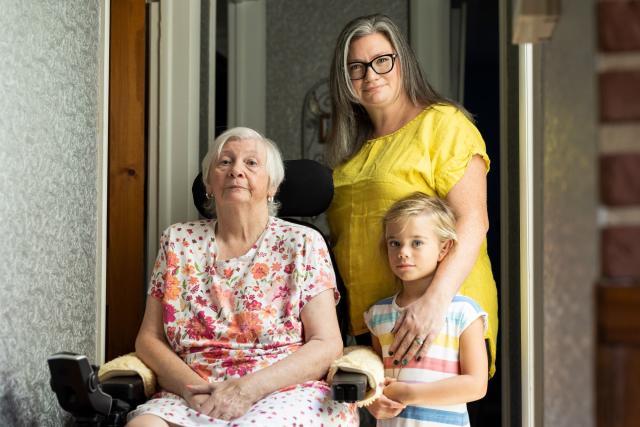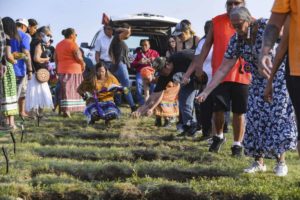For generations, members of one family have died of ALS. A Biogen treatment could break that chain — and escalate a fight over who gets to take experimental drugs, and when.
For years, a family tree spanning two pages of blueprint paper gathered dust at the back of Cynthia Weber’s closet. Going back to a family matriarch born in 1812, it detailed the relationships and causes of death of more than 350 ancestors.
It wasn’t packed away because the family had forgotten about it. Nobody wanted to look at it. Two of Weber’s great grandfather’s cousins died in their 20s, her uncle died at 30, her fourth cousin succumbed at just 25. Three capital letters are scrawled next to their names: ALS.
At least 32 of Weber’s family members have died from amyotrophic lateral sclerosis, the paralyzing illness commonly known as Lou Gehrig’s disease. Outside of the Weber family, ALS is rare. Inside the Weber’s, it’s so common that young family members were told to inform their future spouses about the likelihood of them getting it, in case they wanted to back out.
For decades, nobody knew why this kept happening to the Webers. But in the early 1990s, scientists discovered a mutation that causes rare familial cases of ALS. It was the same gene the family had been passing down for generations. Since then, drugmakers have been working on a treatment that targets the mutation, known as SOD1 — and now Biogen Inc. has one it thinks might work. The hope is that it can slow the course of a disease that’s otherwise a death sentence.
Biogen’s medicine is the first in a new generation of therapies that target known genetic causes of ALS. Some 30,000 Americans suffer from the incurable disease, in which neurons that control the muscles progressively die. New funding and technologies have led to a wave of experimental drugs, both for rare familial forms like Weber’s and for the more common sporadic version of the disease. The ALS community is desperate for a breakthrough: Over the past 80 years, there have been just three new medicines which offer only modest benefits for patients.
The promise of Biogen’s treatment is dependent on whom you ask. The Weber family is staunchly in favor of regulators approving it — Cynthia Weber tried the drug and her family believes it slowed the course of her disease. But last year, in a late-stage trial that Cynthia’s brother with ALS participated in, Biogen’s treatment failed to slow patients’ decline over six months.
That’s normally when a drug company would give up. But Biogen also looked at blood levels of a protein linked to nerve damage and found those measures improved in patients who took its drug. Now Biogen is seeking US Food and Drug Administration clearance for the treatment based on that finding, asking for an “accelerated approval” — a controversial mechanism that allows drugs onto the market before there’s conclusive data that they slow disease symptoms. The company also has applied for approval in Europe.
This isn’t the first time Biogen has put the FDA in an uncomfortable position. In 2020, even though the company’s Alzheimer’s disease drug aducanumab generated contradictory results in two large trials, the company sought approval. The FDA, against the warnings of expert advisers, approved it last year. That led to sharp criticism of the agency. Medicare, the federal insurance program for the elderly, refused to cover the drug outside of clinical trials, meaning very few people will end up getting it.
ALS activists want a better ending for Biogen’s drug. The FDA, they say, needs to treat the disease more like cancer, for which it has cleared dozens of drugs based on limited data through the accelerated approval shortcut. When a disease is fatal, patients are often willing to try drugs whose efficacy isn’t fully proven.
“The FDA hasn’t taken into account ALS patients’ tolerance for risk,” says Brian Wallach, an ALS patient and lawyer who founded the advocacy group “I AM ALS” after he was diagnosed in 2017. Wallach, a key figure behind a new law that helps patients gain access to experimental ALS drugs, speaks through an interpreter, because the disease has impeded his speech. “Every ALS patient we know right now will die,” he said. “What we need to do is to find a way to get access to drugs for these patients as soon as possible so that we give them a chance to live.”
As drugmakers increasingly target incurable diseases like ALS, the FDA is forced to grapple with impossible questions: Should the agency approve medicines that may or may not work if patients are willing to risk anything for a chance at a cure — or even a minuscule improvement? Will approving more drugs based on inconclusive data speed progress in the long run, or could a bad outcome have a chilling effect on research and development? And there’s the ever-present question of cost. Disabling conditions like ALS often force people onto government health insurance such as Medicare, and drugs for conditions like ALS can cost $150,000 a year or more. How much are taxpayers willing to pay for drugs that may or may not work?
Read more: The Alzheimer’s Drug Approval Mess Has Left Millions of People in Limbo
Critical Moment
After Cynthia Weber was diagnosed with ALS in 2020, she became the 32nd person in her family to get the letters “ALS” next to her name. She eventually received Biogen’s experimental drug tofersen through an expanded access program.
“It definitely extended my life. There’s no two ways about it,” Weber, 70, said in an interview with Bloomberg in July. Weber always believed in her independence – she got her nursing degree when she was raising a toddler at home and pregnant with her second child. She recounted her experience with Biogen’s drug from a motorized wheelchair with her two adult daughters beside her at the kitchen table. By that point, her hand muscles had become so weak she couldn’t feed herself without help.
Her youngest daughter, Cassandra, now 42, said the impending FDA decision about Biogen’s drug is about much more than this one treatment. “This is going to be a critical moment in history where the FDA is going to determine the trajectory” for future drugs for the condition, she said. As she spoke from the kitchen, Cassandra’s kids ran around blowing bubbles in the backyard. Though they’re now just 6 years old, they already know the term “ALS.”
ALS is one of the most terrifying ways to die. Nerves that control voluntary muscles — including those responsible for breathing, chewing and swallowing — slowly die, leaving some patients fully paralyzed yet with their minds and senses intact. Most people succumb to the disease within three to five years.
The condition was first described in detail in 1869 by renowned French neurologist Jean Martin Charcot. “Amyotrophic” refers to the muscle atrophy in the disease, while “lateral sclerosis” describes the scar-like residue he saw under the microscope after tiny bundles of motor neurons running down the sides of the spine die.
ALS’s causes are mysterious and its onset variable. In some people, symptoms start in one limb before spreading. In others, nerves that control speaking and swallowing are hit first. While most sufferers decline rapidly, a few people, such as the late physicist Stephen Hawking, have survived for decades.
With so little known about its cause, ALS has been a graveyard for drugmakers, with numerous failed trials. One problem is that the disease is hard to diagnose — there’s no simple test for it. It can take six months or more of ruling out other possibilities before a person will get a conclusive diagnosis, by which point the disease is so far along that many motor neurons are already dead. Riluzole, the first ALS drug to make it to market, was approved in 1995 and extends survival two to three months. Researchers still debate the effectiveness of the second approved drug, Radicava from Mitsubishi Tanabe Pharma, which was cleared in 2017 based on a small trial showing it slows decline by 33%.
Roughly 10% of ALS cases run in families. Cynthia Weber’s relatives have traced cases of ALS-like disease back to ancestors in northwestern Pennsylvania who died in 1865. Studying the genetics of families has given scientists some of the best clues as to what can cause ALS. In 1993, researchers at Massachusetts General Hospital and elsewhere identified the first gene for ALS, a mutant antioxidant protein called SOD1. It turned out to be the gene that runs in Weber’s family. Since then, more than two dozen other faulty genes have been linked to ALS. Cases caused by SOD1 tend to be particularly aggressive.
“Most people in my family die in 12 to 18 months,” Weber’s daughter Cassandra says.
The discovery of SOD1 led to the first mouse model for ALS, which helped researchers test drugs. Further research revealed that the mutant protein was misfolded and toxic, suggesting that a drug that blocked its formation might help treat the disease. By 2010, researchers at Ionis Pharmaceuticals Inc. had started testing therapies that were injected into the spinal canal to block the SOD1 protein.
Ionis first partnered with Biogen in 2012 to develop a treatment for spinal muscular atrophy and expanded the collaboration to ALS in 2013. Ionis designed tofersen, a more potent second-generation version of the drug and in December 2018, Biogen exercised its option to commercialize it and started moving into final-stage trials. It was hoping to duplicate success the companies had in spinal muscular atrophy, where its drug Spinraza lowers the death rate in infants with the disease by 63%.
Controversial Approvals
Because patients die so quickly, ALS hasn’t historically generated the same level of attention as conditions like breast cancer with a large constituency of survivors. That changed in July 2014, when a pro golfer nominated his wife’s cousin to dump a bucket of ice water on her head, kicking off an extraordinary public fundraising effort.
Celebrities including Oprah Winfrey, Mark Zuckerberg, Bill Gates and Derek Jeter participated in the Ice Bucket Challenge, leading to some $220 million in new funds being raised for ALS research globally. The ALS Association received more than half that money and was able to triple its research budget. At least 40 drugs are now in human trials for ALS, it says. That compares with fewer than 30 before the Ice Bucket Challenge, according to an analysis of clinicaltrials.gov.
Another thing happened in recent years that has made investing in risky ALS drugs more appealing to drugmakers: The FDA’s neurology division became more aggressive about approving drugs with limited data. In 2016, the agency controversially approved Sarepta Therapeutics Inc.’s muscular dystrophy drug Exondys 51 after a tiny trial that didn’t prove it slowed disease progression. The following year a different drug for ALS, Radicava, was cleared in the U.S. based on a 137-person study that wasn’t enough to gain approval in Europe. And then in June 2021, the FDA signed off on Biogen’s aducanumab for Alzheimer’s despite the conflicting results from final-stage studies.
The question of how much evidence is good enough played out yet again this year with yet another ALS drug. Amylyx Pharmaceuticals Inc., a small biotech company, developed a combination of two existing drugs that aims to keep nerve cells alive by protecting them from stress. In March, an FDA advisory panel recommended against approval of the drug on worries that a lone trial also with 137 patients, while successful on one measure, didn’t provide enough data to convincingly show it worked.
But in September, the FDA took the unusual step of convening a second meeting to review the drug. The experts heard yet more analyses from the same trial and pleas from patients including Wallach. The company’s co-CEO promised to voluntarily yank the drug off the market if a larger trial that is now underway fails. The panel reversed course and voted in favor of the drug, paving the way for its approval.
Amylyx is charging $158,000 a year for the treatment, but Bloomberg Intelligence analyst Sam Fazeli said it isn’t clear how often doctors will prescribe it given its cost and the limited data behind it. “If it was priced at $30,000 or $40,000, it would have been a different story,” he said.
Read more: Alzheimer’s Trials Exclude Black Patients at ‘Astonishing’ Rate
It’s unclear whether Amylyx will pave the way for Biogen or be a cautionary tale. Biogen is using a different pathway than Amylyx to get its drug approved — the accelerated approval one. That requires Biogen to continue to study its drug even after it’s on the market. Those post-market studies haven’t always happened quickly. In September, the Department of Health and Human Services’ Office of Inspector General found that confirmatory trials were running late for 35 accelerated applications involving 18 separate drugs, including four whose trials were more than five years behind schedule.
In the case of tofersen, Biogen has already conducted a trial that failed to prove the drug slowed clinical decline compared with a placebo. Seven percent of the patients in the trial had serious neurological side effects such as spinal cord inflammation. To get authorization, Biogen is relying on the fact that the drug lowered neurofilament, a protein produced in the blood when nerve cells are damaged. An approval using this “biomarker” could set a precedent for accelerated authorizations for other ALS drugs in the future.
While these scientific questions loom, the FDA faces the emotional appeals from patients who count on the drug as a lifeline.
“If Biogen decided to pull the plug, we are done,” says Jennifer Smolinski, a 45-year-old mother with ALS who is receiving tofersen through Biogen’s expanded access program. She uses a wheelchair but is still able to work from home as a customer service rep for a swimming school nine years after her diagnosis. She is counting on the drug to keep her alive until her kids, ages 10 and 13, graduate from college.
Trial Trouble
Cynthia Weber’s brother Duane Lindsey, a retired software engineer, was diagnosed with ALS before she was and managed to get into Biogen’s phase 3 trial. In April 2019, he noticed he couldn’t lift weights with his right leg at the gym. His ALS diagnosis was confirmed by August and the next month, he joined Biogen’s trial and started getting spinal injections, each of which involved an overnight trip to a trial site 350 miles (563 kilometers) away from his home in North Carolina. That fall, his condition stabilized, his family says. But when the pandemic temporarily shut down the trial site in 2020, Lindsey missed three injections. His ALS quickly progressed and he died in July 2020 at age 66.
“All I can tell you is that when he was being treated there was little to no progression and the minute that the treatment stopped, he declined rapidly,” says Tina Goodman, his widow. But neither Goodman nor Cynthia Weber knew whether Duane was on the drug or the placebo – drug trials require patients and families to be “blinded” to that information. Because the trial is still collecting data, Biogen won’t reveal whether Duane got the drug.
Shortly after his death, Weber started developing weakness in her right leg. She didn’t tell anyone and avoided going to a doctor until the fall, when Cassandra noticed she was limping and confronted her.
Cassandra raced to get her mom into Biogen’s tofersen trial. A genetic counselor told her there were two slots left. By the time her mom had completed the necessary screening tests to confirm she qualified for the trial, it was full.
Not long after, Cassandra herself got tested for SOD1. When the genetic counselor revealed the results in a Zoom call, she felt like she was having a heart attack. She had inherited one copy of the SOD1 gene from her mother. That meant she has roughly a 90% chance of developing ALS by age of 70. Her older sister didn’t inherit the gene. Cassandra requested that her last name not be used in this story.
By June 2021, Cynthia Weber had lost the ability to walk and started experiencing weakness in her arms and neck. But it still wasn’t clear whether she was progressing fast enough to get the drug through a program that the company was planning to open, after facing pressure from patients and their families. Cassandra herself sent an impassioned email to numerous Biogen executives: “We need help and we are out of time. We are desperate,” she wrote. “Although my words will likely fall on deaf ears, I hope someone, somewhere, decides to help us.”
Cassandra never received a reply, but her mother did qualify for Biogen’s expanded-access program when it started the following month. Biogen says it approved Weber’s application the same day it was received and that she was the first person to receive tofersen as part of its program. She received 11 doses between July 2021 and April 2022. Each treatment involved one of her two daughters taking her on a daylong trip to the University of Pennsylvania so it could be injected into her spinal fluid.
Meanwhile, Cassandra signed up for a Columbia University study following family members at risk of ALS. She also joined a Biogen trial testing tofersen as a preventive treatment in healthy SOD1 carriers like herself. In that trial, Cassandra’s neurofilament levels are measured regularly and she will be assigned to take the drug or a placebo as soon as her levels start to rise above a threshold, which is believed to occur right before the onset of symptoms.
Cassandra was shocked when the Biogen said the tofersen late-stage trial failed in October 2021. She thinks the problem is that Biogen only compared the drug with a placebo for six months. Doctors explained to her that it takes a few months for the drug to lower SOD1 protein levels, meaning the trial didn’t allow much time for the drug to show an effect.
Cynthia Weber remained on tofersen through the winter and spring of this year. She enjoyed the holidays, spending Christmas at Cassandra’s house opening presents with the grandkids and extended family. But she was too weak to stay overnight as she had done in the past. In early May of this year, Cassandra gave a speech at a rally in Washington, D.C., organized by Wallach’s I AM ALS, a nonprofit advocacy group.
“Some families pass on genes for blue eyes or red hair. My family passes on a legacy of death,” Cassandra said. “We are pushing the archaic and slow system to save our loved ones.”
Not long after she got home, Cassandra got a plaintive call from her mom. “I don’t want to live anymore,” her mother told her. She was thinking about committing suicide by overdosing on her drugs. Cassandra raced the 80 miles to her mother’s house in rural Mifflintown and found her legs covered with bruises. Weber had become too weak to move herself from her wheelchair to the toilet, and her 83-year-old partner was too frail to help. Cassandra talked her mom out of killing herself and convinced her to move in with her older sister and enter a home hospice program, which meant stopping all treatments.
Meanwhile, Biogen continued to share results about tofersen. It reported at a conference in June that people who had received the drug early on had less decline than those who had originally been on placebo and got switched to the drug later. The analysis was promising enough that a neurologist asked Cassandra whether her mom wanted to start taking the drug again.
She didn’t. She wanted to stop treatment because the trips were a burden on her family, the lumbar punctures were painful, and she had a sense she was dragging out the inevitable. In late August, Cynthia Weber, like dozens of her family members that had come before her, died of ALS. Her family buried her ashes at a hillside cemetery in rural Warren County, Pennsylvania, where she grew up. Her great-great-great grandmother, who died from probable ALS in 1865, is buried just 10 miles away.
Cassandra sees tofersen’s approval as a matter of life or death, for herself and possibly also her children, if they turn out to have the faulty gene. Her 6-year-old fraternal twins, a boy and a girl, are starting to ask pointed questions about the disease. Her daughter recently asked before bedtime whether she was going to get ALS someday. She was upset that Cassandra didn’t tell her that her grandmother had ALS until after her death.
On Oct. 17, just two days after Cassandra buried her mother, Biogen announced that the FDA had postponed its original deadline for deciding whether to approve tofersen by three months, from January until April. The agency needed more time to review additional analyses Biogen had submitted. Cassandra was angry. She thinks the drug should be approved now, giving dying patients the chance to decide for themselves.
“I am banking my future survival” on Biogen’s drug, Cassandra said. “If it is not approved, I don’t know what will happen.”
To contact the author of this story:
Robert Langreth in New York at rlangreth@bloomberg.net
To contact the editor responsible for this story:
Cynthia Koons at ckoons@bloomberg.net
Timothy Annett
Mark Schoifet




